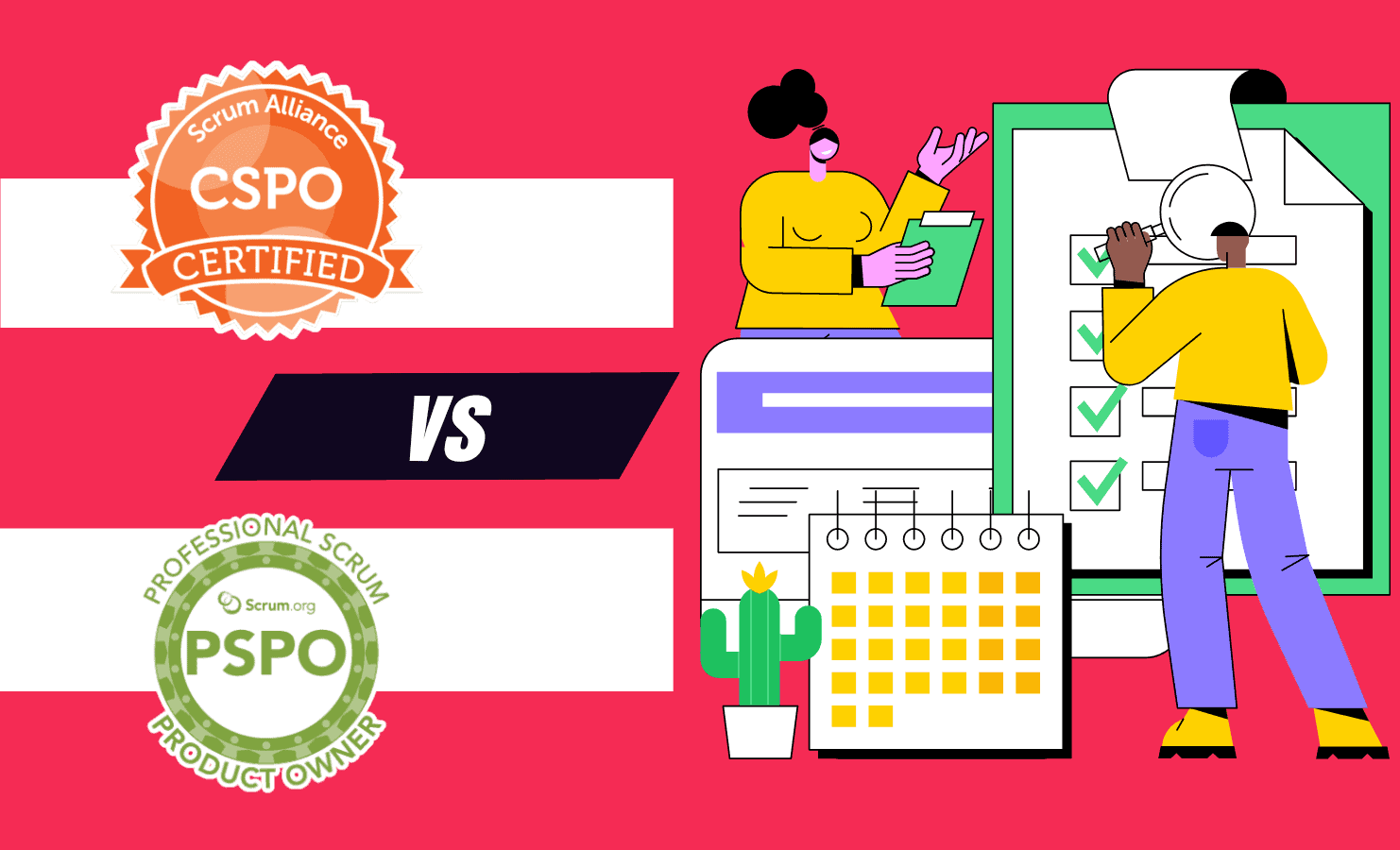
Why you can trust us
- 407 Cloud Software Products and Services Tested
- 3056 Annual Software Speed Tests
- 2400 plus Hours Usability Testing
Our team of experts thoroughly test each service, evaluating it for features, usability, security, value for money and more. Learn more about how we conduct our testing.
Key Takeaways: CSPO vs PSPO
- The Certified Scrum Product Owner certification, offered by the Scrum Alliance, is an entry-level certification with no final exam. It covers the fundamentals of Scrum, product visions, sprints, backlogs, stakeholder interactions and release management.
- The Professional Scrum Product Owner certification, offered by Scrum.org, covers Scrum fundamentals; the product owner role; working with stakeholders, customers and dev teams; and managing and delivering products. It’s slightly more challenging and features an examination that requires a passing score of 85% or higher.
- Both the CSPO and the PSPO certification can help you increase your knowledge of Agile and Scrum, gain recognition and respect, land better jobs and increase your earning potential.
Facts & Expert Analysis About PSPO vs CSPO:
- Product owner salaries: On average, an experienced product owner (PO) in the U.S. can expect to make roughly $97,000, while entry-level POs earn approximately $71,000 annually.1
- Product owner demand: Research shows that demand for product owners is on the rise. The job market for product owners is expected to grow 10% between 2018 and 2028, and roughly 33,700 jobs are expected to be created over the next decade.2
- Highly respected: Those seeking the CSPO or PSPO certification need not worry about job prospects. Both certifications are respected in the Agile project management field, and the institutes offering them — the Scrum Alliance and Scrum.org — are prestigious.
Product owners are crucial members of scrum teams. Without POs, stakeholder communication would cease, backlogs would fall apart and product visions wouldn’t emerge. Even the best project management software won’t help teams that don’t have a good PO. If the role appeals to you but you aren’t sure which certification to get, our CSPO vs PSPO guide will help.
Below, we’ll cover two of the most well-respected product owner certifications: the Certified Scrum Product Owner (CSPO), offered by the Scrum Alliance, and the Professional Scrum Product Owner (PSPO), offered by Scrum.org, both of which made our roundup of the best Scrum certifications.
By the end of this guide, you’ll know how the certifications differ, how much they cost, what the coursework and exams look like and how the project management community feels about each. We know you’re eager to learn, so let’s jump in.
Meet the experts
Learn more about our editorial team and our research process.
What Is CSPO?
The Scrum Alliance offers the Certified Scrum Product Owner (CSPO) certification. This participation-based course is for those who want to become a vital team member in the Scrum framework.
Project Management
Check out our project management courses and grab a limited-time offer.
Registration available now!
Enroll Now 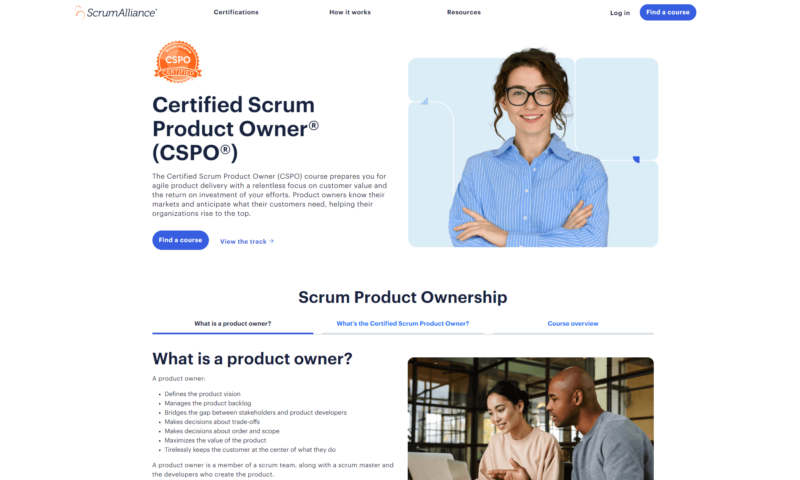
The Scrum Alliance offers the entry-level CSPO certification.
The entry-level course — the first of three for POs that the Scrum Alliance offers — covers topics such as Scrum basics and roles, customer satisfaction, communication, backlogs, sprints and release management, all of which will go a long way in an Agile software development project.
The 14-hour course is taught by a certified Scrum trainer and has no exam component, which will certainly appeal to many. The only downside is that the certification must be renewed every two years and requires continuing education and extra payments.
What Is PSPO?
The Professional Scrum Product Owner (PSPO) certification will help you attain a prominent role in the Scrum framework. This certification for new product owners covers Scrum fundamentals; the product owner role within a scrum team; working with stakeholders, customers and development teams; managing products; and working in Agile organizations.
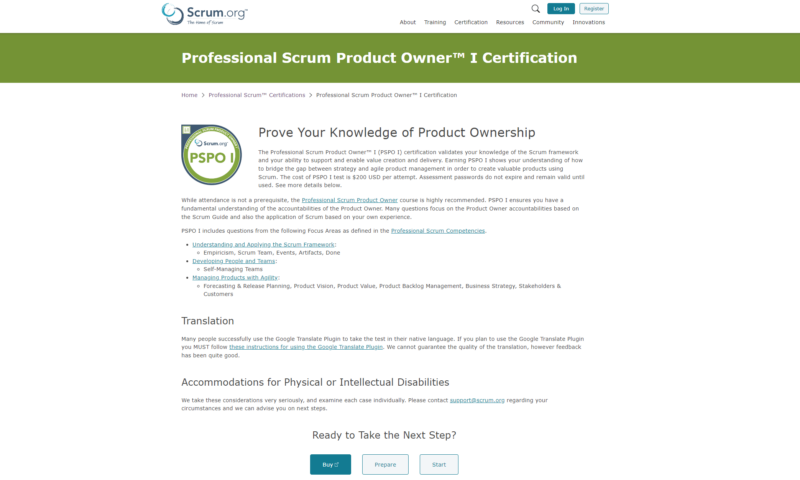
Ken Schwaber, co-creator of Scrum, founded Scrum.org, which offers the PSPO certification.
The most significant difference between the CSPO and PSPO certifications is that the PSPO doesn’t require you to attend a course, but it does have a tough examination process. Participants can opt to take a class if they wish to learn the material, or they can self-study.
To obtain the PSPO certification, which doesn’t have a renewal requirement, you must score 85% or higher on the exam. Still, this shouldn’t put off those wishing to enhance their Agile framework skills. Obtaining this certification will open the doors to Scrum.org’s other PSPO certifications: the PSPO II and the PSPO III.
At A Glance: Difference Between CSPO and PSPO
Below, you’ll find a handy table that breaks down the main differences between the CSPO I and PSPO I certifications. Use it to quickly compare both Scrum training options before moving into our more detailed breakdown of the key differences.
| Features | PSPO | CSPO |
|---|---|---|
| Accreditation Body | Scrum.org | The Scrum Alliance |
| Requirements | No PSPO training requirements | 14 hours of coursework with professional Scrum trainers. |
| Topics Covered | 1. Scrum fundamentals 2. The role of a product owner 3. Working with stakeholders 4. Working with customers 5. Working with a scrum development team 6. Managing products 7. Delivering products 8. Agile organizations |
1. Scrum basics and roles 2. Product visions 3. Customer satisfaction 4. Key stakeholders 5. Scrum master communication 6. Product backlogs 7. Sprints 8. Release management |
| Course and Exam Fees | No course is required; the exam fee is $200 per attempt. Courses cost $1,395 to $1,495 and typically include one exam attempt. | Prices for the required 14-hour course range from $300 to $1,250. Most courses are online but are also offered in person. |
| Renewal Policy | No renewal | Must be renewed every two years |
| Exam Structure | The PSPO exam lasts 60 minutes and features 80 multiple-choice, multiple-answer and true-or-false questions. The passing score is 85%. | No examination |
Key Differences Between CSPO and PSPO
The table above provides a quick glance at the major differences between the PSPO and CSPO certifications. Below, we’ll take an in-depth look at how key certification differences could impact you.
Requirements
One of the biggest differences between the CSPO and PSPO certifications is the requirements. The PSPO certification has no requirements. Anyone who wants to take the exam can do so without sitting through a course. This is ideal if you already have a solid understanding of Scrum and the product owner role or prefer to self-study. Still, taking a PSPO course is recommended.
The CSPO certification has an entirely different setup. To acquire this certification, you must attend a 14-hour, certified instructor-led course (typically over a two-day training period). The courses are available online and in person. The bonus of attending this instructor-led training is that there’s no exam. Once the course is complete, you receive the Scrum certification.
Cost
If cost is a deciding factor, you’ll likely want to consider the PSPO certification over the CSPO. The PSPO exam costs $200 per attempt, and there is no requirement to take an expensive course. If you prefer, you can self-study for free — and even get some practice by using a project management software like monday.com to organize your learning.
You can access the Professional Scrum Competency guides via the official Scrum.org website. However, should you wish to take a course, you can expect to pay between $1,395 and $1,495. These prices generally include one exam attempt.
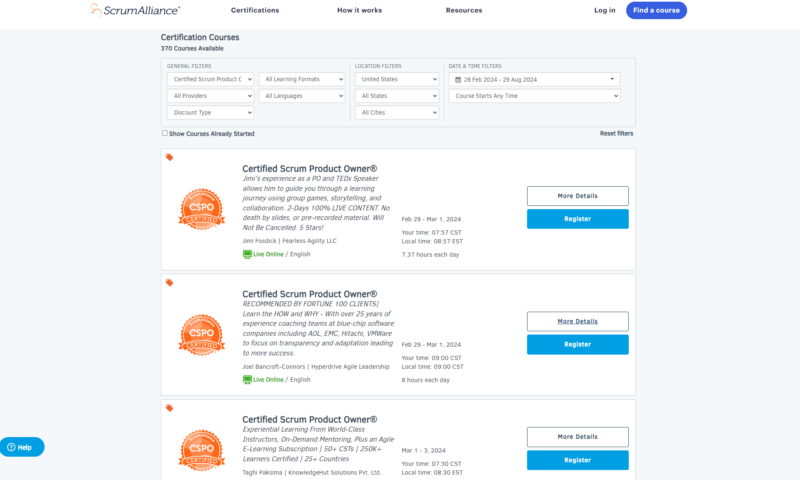
The cost (and possibly the quality) of CSPO courses varies by provider.
Courses for the CSPO certification range from $300 to $1,250, but there is no extra exam fee, as there is no exam. However, do your due diligence to determine the quality of the courses and what exactly you’re getting for your money.
To conduct due diligence, carefully read the course descriptions to make sure they cover the correct topics, determine whether learning materials are provided and read feedback about the course and trainer. Keep in mind that to meet Scrum Alliance requirements, a certified Scrum trainer must lead the course.
Examinations
If you’re not a fan of exams, the CSPO certification will appeal to you. To receive your certification, you must attend and participate in 14 hours of instructor-led training. However, the exam is the only way to obtain PSPO certification.
The PSPO exam lasts 60 minutes and features 80 multiple-choice, multiple-answer and true-or-false questions. It is an open-book exam, which should make things easier, but you’ll need to score 85% or higher to pass.
Certification Renewal
Another factor to take into consideration from a cost and time standpoint is certification renewal requirements. If you opt for the PSPO certification, once you have it, it’s yours. There are no renewal requirements, unlike with the CSPO certification.

The Scrum Alliance makes you renew the CSPO certification every two years.
The CSPO certification must be renewed every two years. Certification renewal requires 20 Scrum education units (EDUs) gained via continuing education, volunteering, participating in official Scrum Alliance events and reading Scrum Alliance articles. You must also pay a $100 renewal fee. This means the CSPO will cost more than the PSPO in the long run.
How to Get CSPO Certification
If you’ve decided to go for the Certified Scrum Product Owner certification after reading this guide, congratulations! The CSPO certificate will serve you well during your product ownership career. Below are the steps you’ll need to take to get the certification.

Obtaining the CSPO certification from the Scrum Alliance is relatively straightforward.
- Sign Up for a Certified Instructor-Led Course
Head to the official Scrum Alliance website and select the “find a course” option. From here, refine your search to include the CSPO course, exclude online or in-person courses and select dates and times.
- Attend the Class
After signing up, attend the course (which typically lasts two days) and participate. At the end of the 14-hour course, you’ll have your CSPO certification.
- Maintain Your Certification
The last step for those who obtain the CSPO certification is renewal. Ensure that you earn 20 Scrum education units every two years as a sign of commitment to continuous improvement and pay a $100 fee.
How to Get PSPO Certification
Congratulations to those of you who have decided that the PSPO certification is the one for you. After learning about Scrum terminology, a project’s key stakeholders, the product backlog, the Scrum model and more, it’s time to get your hands on the certification. Below are the steps you’ll need to follow to become PSPO certified and embark on a project management career.
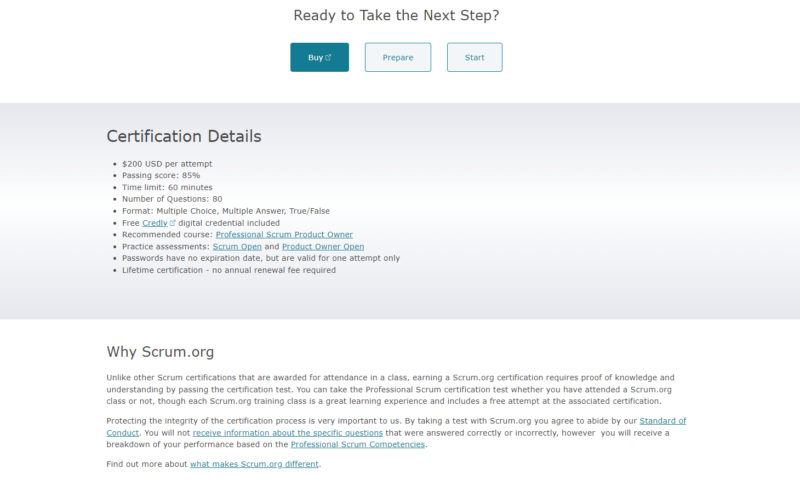
It’s important to assess whether you’re ready to sit for the PSPO
certification exam or need more training.
- Determine Whether You Are Ready for the Exam or Need Training
Assess whether you’re ready to take the exam or would benefit from more training. If you want to attend a course, head to Scrum.org and click the “training” icon, then refine your search to include PSPO training for dates and times that suit you. Once you’ve found an option, sign up for the course. If you’re ready for the exam, create a Scrum.org account and register.
- Attend the Course or Self-Study for the Exam
If you decide to participate in a PSPO training course, attend it and soak up all the information. Alternatively, if you want to save money, self-study for free using Scrum.org materials to prepare for the exam.
- Take the Exam
Once ready, you can sit for the PSPO exam. Decide whether you want to take the PSPO exam online or in person. The exam lasts 60 minutes, features 80 questions and requires a score of 85% or higher to pass.
Which Certification Should You Choose: CSPO or PSPO?
The foundation-level CSPO and PSPO certifications are ideal for those wishing to become product owners. Both certifications will help demonstrate that you have the knowledge and ability to create a product vision, communicate with a project’s key stakeholders, motivate a scrum development team, and deliver a top customer experience.
To make things easier, decide whether you want to attend a course without an exam but pay for continuing education and renewals, or take an exam without attending a course and not worry about the total cost increasing every two years. Otherwise, the certifications cover identical topics and will open many of the same job opportunities.
If you’re still having trouble choosing between the two certifications after reading this guide, you can see what other product owners think about CSPO and PSPO on Reddit and other social media platforms.

If you still can’t decide, see what your product owner peers think of the certifications
on community pages like Reddit.
Users on Reddit speak highly of both certifications but generally lean towards the CSPO; it is slightly more respected than the PSPO, as the Scrum Alliance carries more weight than Scrum.org. However, many users also state that you should look at job listings in your area of residence to see if they mention a preference for one certification over the other.
Final Thoughts
If you think you have the required hard and soft skills to become a product owner and want to become certified, you can’t go wrong with either the CSPO or the PSPO certification. Both will prove to current or prospective employers that you have the skills to design product visions, engage stakeholders and clients, lead development teams and increase customer value.
Once you have become certified and are ready to apply for a product owner position, use our product owner interview guide to help prepare yourself. Which certification sounds like the best option for you? Have you already obtained either certification? How did it impact your career? Let us know in the comment section and, as always, thanks for reading.
FAQ: PSPO vs CSPO
-
The PSPO and CSPO certifications are nearly identical and will allow you to apply for and obtain entry-level product owner positions. However, the Scrum Alliance’s CSPO certification is held in slightly higher esteem, even though it doesn’t require you to pass an exam.
-
Yes, many companies recognized Scrum.org’s PSPO certification. It is one of the top entry-level certifications aspiring product owners can get their hands on.
-
Both the CSPO and the PSPO certification are ideal for product owners. The Scrum Alliance does carry slightly more weight than Scrum.org, but both certifications will prove that you have the required skills to lead an Agile development team.
-
The PSPO certification can help you land an entry-level product owner position, which comes with an average annual salary of $71,000 in the U.S.
The PSPO and CSPO certifications are nearly identical and will allow you to apply for and obtain entry-level product owner positions. However, the Scrum Allianceu2019s CSPO certification is held in slightly higher esteem, even though it doesnu2019t require you to pass an exam.n”}},{“@type”:”Question”,”name”:”Is PSPO Recognized?”,”acceptedAnswer”:{“@type”:”Answer”,”text”:”
Yes, many companies recognized Scrum.orgu2019s PSPO certification. It is one of the top entry-level certifications aspiring product owners can get their hands on.n”}},{“@type”:”Question”,”name”:”Which Certification Is Best for a Product Owner?”,”acceptedAnswer”:{“@type”:”Answer”,”text”:”
Both the CSPO and the PSPO certification are ideal for product owners. The Scrum Alliance does carry slightly more weight than Scrum.org, but both certifications will prove that you have the required skills to lead an Agile development team.n”}},{“@type”:”Question”,”name”:”How Valuable Is PSPO?”,”acceptedAnswer”:{“@type”:”Answer”,”text”:”
The PSPO certification can help you land an entry-level product owner position, which comes with an average annual salary of $71,000 in the U.S.n”}}]}]]>
Sources For Publication:
Let us know if you liked the post. That’s the only way we can improve.
